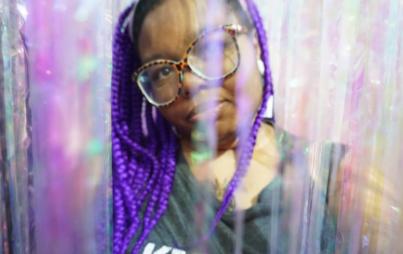
The Guardian's recent interview with Tess Holliday has sparked much controversy among fans and non-fans of the first ever plus-size supermodel.
I am a woman of color, and when I first read the article, it made me think of the white women I know who exclusively date black men. And so Tess's comment, “I do admit that black men love me. I always forget that, and then I come to a black neighborhood and I remember,” was not a surprise to me. I know many black men who will date fat white women, but not fat women of color, which I find problematic. It's just one of many symptoms of internalized racism, which I'll get into another time.
I was on the fence about whether or not the comment she made was meant to be racist, because my experiences with Tess have only been positive. And she has publicly said that she does not want to be a role model. But whether she wants it or not, fame comes with a big responsibility, and that means you are under great scrutiny.
After reading the article, and the social media debates about her comments, I began dialoguing with other body positive activists who helped me to see this issue more clearly. They reminded me that you can be white and nice, and still be racist. And that doesn't mean a person's racism is intentional, but it still exists. They may be unaware of their privilege or have never been called on it.
So, I decided to take this opportunity to unpack a few things I'm learning about white privilege and racism.
For white folks reading this article, I want to break this down for you so we can engage in meaningful dialogue instead of exchanging expletives. I believe the only way to get to a better place is a willingness to listen and communicate honestly.
Having said that, you must first accept that your skin color gives you the kind of unearned privilege that keeps you from being harassed or gunned down by police officers. It means that if you have the same resume and credentials as LaKeisha James, you're probably going to get the job (learn more here). And it means that when you buy nude panties, they will probably match your skin color.
I've written about my own privilege as a mixed-race woman, so I know how important it is.
So, how can you learn to unpack your privilege?
1. Listen when people of color talk to you about their experiences. I know this seems obvious, but when I say listen, I mean really listen. Because sometimes we are just waiting for our turn to talk, and that's not helpful to anyone. While you may not be able to empathize with our experiences, you can sympathize, and get a better understanding of how privilege benefits you and puts people of color at a great disadvantage.
2. Don't get defensive or try to uphold your arguments with excuses. I think most of us get defensive when someone is challenging our world view. It brings into question all of the ideas we hold true and probably grew up with. Putting down our defenses allows us to learn about something new. An excuse is not a willingness to learn. It is a signal that you believe you know everything. And most of us don't.
3. Ask questions when you don't understand. Understanding racism is complicated and nuanced. Therefore, when you decide you want to see how you might be contributing to it, it helps to ask the right people the right questions. Talk to folks of color and talk to other white folks who have an understanding of their privilege. This is not something you're going to learn about on FOX news, so get out of your comfort zone and be prepared to be uncomfortable for a while. Hey, we deal with this shit every day, so your temporary discomfort is really no big deal.
4. Engage with people of color and admit that you are still learning. Understanding the varied impacts of racism when you're white takes a big commitment. It isn't a singular conversation or experience that helps you understand the hideousness of it. You must be willing to check yourself and admit that you are still learning. And I think if you are genuine, people will get that. So be intentional about who you spend your time with and what you talk about. When we know better, we do better.
5. Commit to being an ally. An ally is someone who recognizes their unearned privilege in our society's unjust system, and is committed to creating change. As much as some people believe we live in a post-racial America (because we have a black President), we simply don't. The oppression people of color face in this country is both subtle and obvious. It creeps into all areas of our lives, and demands that we challenge it on a daily basis just to survive. If you've never heard of Tim Wise, please check him out. He is a white scholar who writes a lot about white privilege and race.
My list is by no means exhaustive, but it's a place to start. Keep doing research and decide if you want to be part of the solution instead of the problem.
I like Tess, and I appreciate the barriers she is helping to break down for fat chicks. I hope this experience helps her and others to see how they can be more inclusive in their activism, and check their privilege.
In solidarity,
Pia








